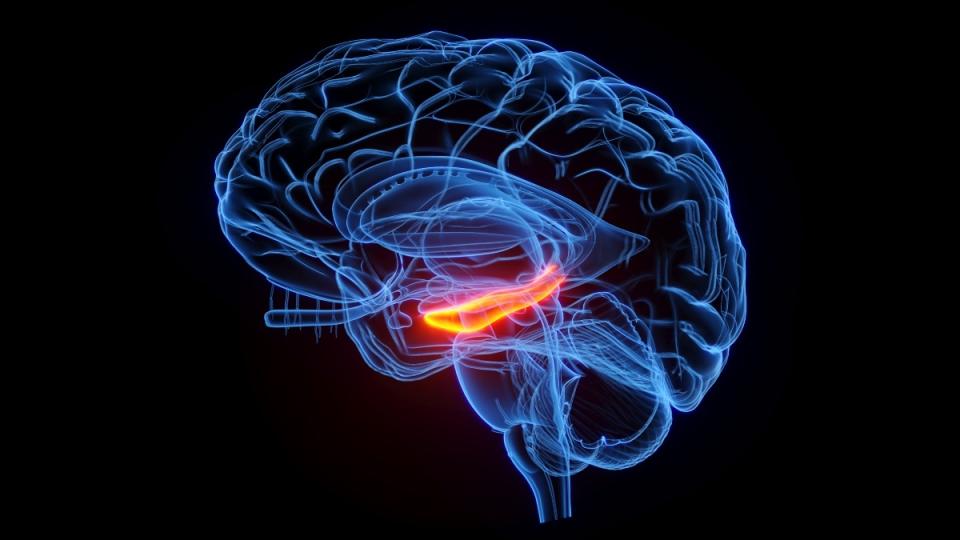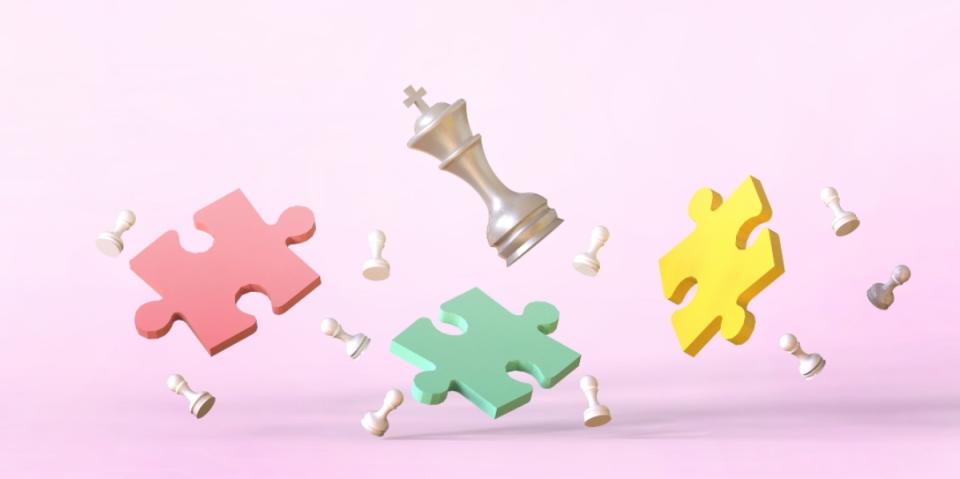The 7 Best Ways To Reverse Brain Aging & Strengthen Memory, According to Scientists
If you’re like us, you sometimes forget where you parked your car while running errands or struggle to recall an acquaintance’s name stuck on the tip of your tongue. And it may leave you wondering if these memory lapses are cause for concern. Don't worry — it’s normal to experience brain blips as we age. Those “senior moments” of forgetting where you put your glasses or why you walked into a room are typically nothing to fret over. But that doesn’t make them any less frustrating or embarrassing! So we asked brain aging experts to explain why these blips happen in the first place and when you should see a doctor. Plus, they reveal how to strengthen your memory (the easy way!) for years to come.
How memories are formed in your brain
When it comes to memories, you won’t find them stored in one particular place in the brain. Rather, you’ll find them across different regions of the brain that were active at the time of that memory.
One key region is the hippocampus. “The hippocampus is considered the epicenter and without it, we can’t form new memories,” explains Kaitlin Casaletto, PhD, a board-certified neuropsychologist and associate professor in the department of neurology at the UC San Francisco Memory and Aging Center. “It’s generally thought that incoming information is processed through the hippocampus, then distributed and stored across the cerebral cortex.”

Whenever you try to retrieve a memory, the hippocampus becomes activated. “You can think of the hippocampus as the critical filing cabinet that helps put information in the right place and pulls it back out when needed,” explains Casaletto.
Memory loss occurs when the memory-related brain regions aren’t working as they should. One key reason is the physiological changes that happen to the brain as we age, such as a decrease in the volume of the hippocampus and the frontal and temporal lobes in the brain.
How your brain changes as you age
As we age, our body goes through some expected physical changes, such as graying hair or not having the energy of a 20 year-old. And though you may not see it outright like a new forehead wrinkle, your brain is going through changes, too.
“Starting in our 40s and 50s, several biological processes appear to shift in the brain," Casaletto says. "This includes greater inflammation, disruption to the brain’s vascular system, which provides oxygen and nutrients to the brain, and a breakdown of myelin, the fatty sheaths that insulate parts of our brain cells to facilitate fast communication."
"There’s also an accumulation of misfolded proteins," notes Casaletto. "This is when structural changes in our normal brain proteins cause them to become neurotoxic, which can disrupt how our brain cells communicate."
More common causes of memory lapses
Aside from the aging, there are other everyday health issues can make your memory seem faulty. Some common culprits:
1. Menopause
"During menopause, there’s a rapid decline in the sex hormones estrogen and testosterone," explains Casaletto. "We know that sex hormones are neuroprotective. They help build connections in the brain, keep our vascular system well-oiled, and help to regulate our immune system."
In fact, Harvard researchers found that estradiol, the primary form of estrogen that works in the brain, safeguards memory. And research in the journal Neurology suggests estrogen prevents a decrease of grey matter in the brain, which is essential for controlling memory.
2. Lack of sound sleep
Memory consolidation, or the process of preserving vital memories and discarding excess information, takes place while you’re sleeping. The problem: Most of us aren't getting enough sound Zzzs to keep our thinking and memory sharp. (Click through to learn how a type of sound therapy known as binaural beats improves sleep by changing brainwaves.)
“Getting 7 to 8 hours of quality, restorative sleep a night is critical if you want your cognitive function and memory working at an optimal level,” says Ken Sharlin, MD, a board-certified neurologist at SharlinHealth and Neurology, his private practice in Ozark, Missouri, and author of The Healthy Brain Toolbox.
One way to see if you’re getting enough quality sleep is by tracking your sleep patterns using a sleep app. “I use a couple of sleep tracking apps, AutoSleep and Pillow, on my phone so I can collect data on how I’m sleeping,” he says. “With these apps, you can get a pretty reasonable idea on your sleep quality, how many times you wake up, and if you’ve had a healthy dip in your heart rate overnight.” For Android users, consider Sleep Cycle: Sleep Tracker or SleepScore.

3. Medication
Some of the most common offenders are over-the-counter antihistamines and sleeping aids, which can bring on drowsiness and cause confusion that could be interpreted as memory lapses. In fact, “Chronic use of these type of over-the-counter medications are associated with an increased risk of dementia,” warns Dr. Sharlin.
Many prescription medications can interfere with memory, too. That includes anti-anxiety, anti-seizure, certain anti-depressants, heartburn and anti-inflammatory drugs, according to the AARP.
Memory blips that are a normal part of aging
“The most common symptoms in ‘normal aging’ are word and name finding difficulties, general slowness in thinking, and difficulties holding multiple pieces of information in mind, such as walking into a room and forgetting why,” says Casaletto.
It’s also not unusual to misplace things, momentarily get confused over the names of grandchildren, or occasionally forget an appointment, adds Dr. Sharlin.
When memory lapses may be a cause for concern
While brain blips here and there are a normal part of aging, you'll want to schedule a visit with your doctor if you notice a more significant disruption in your everyday life. “You really need to take stock of how you’re functioning on a daily basis,” advises Jessica Zwerling, MD, a neurologist and professor of neurology at the Albert Einstein College of Medicine in Bronx, NY.
Dr. Zwerling says memory lapses that can be red flags include having trouble remembering to pay bills when you never did before, forgetting an important ingredient in a recipe you make all the time, or getting lost in a neighborhood or familiar places like a store where you struggle to retrace your steps.
Other troublesome signs are repeating comments or questions in a short period of time, not remembering information that should be fresh in your mind, such as you ate for breakfast, or no longer being able to use a piece of technology that was previously okay, like your smartphone, says Casaletto. These could potentially be early warning signs of memory disorders such as dementia or Alzheimer's disease.
“Often during an annual wellness visit a primary care provider will ask questions about memory and do a validated cognitive screening if the patient has concerns,” says Dr. Zwerling, who is also the director of the Montefiore Hudson Valley Center of Excellence for Alzheimer's Disease in Yonkers, NY.
7 natural ways to strengthen your memory over time
“We are increasingly learning we can control much more of our brain health destinies than previously thought,” says Casaletto. “Brain health prevention starts in midlife, which is why it’s important to participate in activities during this time and throughout your life to keep your brain sharp well into your golden years.” Here, our experts reveal 7 easy, natural tricks that strengthen your memory.
1. Take a multivitamin
Few of us eat a perfectly balanced diet every single day. But even minor shortfalls in key brain nutrients such as vitamins B-12, C, D, zinc, calcium, and magnesium can trigger brain blips. “When you’re not getting the adequate amounts of vitamins and minerals, it can make thinking harder,” says Casaletto.
But simply taking a multivitamin daily can fill in those nutrient gaps to strengthen your memory. The proof: A study in The American Journal of Clinical Nutrition found that older adults who took a multivitamin daily for one year improved their memory so effectively that it was like taking off more than three years of brain aging. The supplement used in the study: Centrum Silver Adults 50+ (Buy from Amazon, $18.94).
2. Visit a friend
Being a social butterfly is a boon for your brain, according to research in The Lancet Healthy Longevity. Scientists found socially interacting with friends and family and participating in group activities with others on a weekly basis slows cognitive decline, specifically when it comes to memory and language. These social connections can be fostered by playing board games with the family, joining a book club or playing pickleball with friends.
Strong social networks keep you engaged, stimulate your brain, and act as exercise for your memory and language skills. Another plus: Bonding with others lowers stress, which University of Alabama at Birmingham research has linked to memory trouble. (Click through to learn how to make friends after 50.)

3. Savor a tuna melt
Go ahead and dig into a tuna melt for lunch or grill up salmon skewers for dinner. A beneficial type of omega-3 fatty acid known as DHA is found in fatty fish such as tuna, salmon, sardines, anchovies and mackerel. The "friendly fat" help the cells in your body function properly, including those in our brain. “You want your brain cells to be high in DHA, since the brain is mostly composed of it,” says Dr. Sharlin.
The benefits of upping your intake: A study in Neurology found that older adults who regularly ate cold-water fish and foods high in omega-3s had increased volume in the hippocampus, the part of the brain that plays a role in learning and memory. They also had better logical thinking skills, or the ability to analyze a situation and come up with a solution.
To strengthen your memory, aim for two servings of fish (about 4 oz. each, or the size of a deck of cards) a week. Not a seafood lover? Consider a fish oil supplement with 1,000 mg of omega-3s daily instead. One to try: Vitacost Omega-3 Fish Oil. (Buy from Vitacost, $7.99).
4. Do a puzzle
“The brain loves learning new things, so I recommend novelty as a general principal when thinking about boosting brain health,” says Casaletto. For instance, instead of playing Wordle or Candy Crush every day, mix it up and take up Sudoku or start doing jigsaw puzzles to strengthen your memory. Research has shown the brain only makes new connections when you’re tasked to learn something new, she says.
Not into games or puzzles? Simply trying a new hobby like knitting or changing up your routine can provide the same benefits. That can mean taking a different route to the store or striking up a conversation with a new person in a supermarket checkout line. (Click through for The Best Hobbies for Women Over 50 — And The Surprising Health Benefits of Each.)

5. Get lost in a good book
Permission to put off your chores in favor of cozying up with the latest rom-com or mystery novel. Turns out it's one of the most relaxing ways to strengthen your memory. A study in Frontiers in Psychology of adults aged 60 to 79 found those who read leisurely for 90 minutes a day, five days a week, significantly strengthened their memory within 2 months. The researchers found reading improves both working memory, the kind needed to reason and problem solve, and episodic memory, the kind needed to retrieve long-term memories of life events, by keeping your mind active as it follows along the storyline. (Click through to discover our favorite cozy fall reads.)
6. Bike around the block
Sure, you know exercise strengthens your muscles. But research shows it strengthens your memory, too. According to the CDC, cognitive decline is almost twice as common in people who aren’t active compared to those who are.
Physical activity boosts blood flow to the brain, especially to two key regions linked to memory, report researchers at the University of Texas Southwestern Medical Center. Their one-year study of people 60 and older who were at risk for dementia found those who engaged in 12 months of aerobic exercise showed a 47% improvement in memory scores compared to those who simply stretched.
And you don't need to run a marathon to get the benefits. Biking around the block, taking a brisk stroll or simply dancing around the house will do the trick. Bonus: Even a brief burst of activity can strengthen your memory. A study in the journal PNAS found just one 10-minute period of low-intensity stationary bike pedaling increased activity in the brain's memory-managing hippocampus. (Click through to learn why Denise Austin loves pickleball.)

7. Scent your bedroom
It may sound strange, but inhaling the aroma of essential oils for just two hours while you sleep strengthens your memory, according to a study in Frontiers in Neuroscience. Folks age 60 to 85 used an aromatherapy diffuser that rotated between a different scent each night, including rosemary, peppermint, lemon, orange, lavender, rose and eucalyptus. After 6 months, those who smelled the scents performed a whopping 226% better on a memory test than those who didn’t practice aromatherapy.
Why? Your sense of smell is directly connected to your memory circuits. So when your ability to smell is fades as you age, it can make it harder to access memories, the study authors note. But allowing uninterrupted time to smell the gentle aromas improves the pathways connecting your olfactory system and memory circuits. Plus, olfactory stimulation helps you sleep deeper, which can make your brain work better the following day.
3 ways to improve your memory instantly
Need an instant brain boost? Try these simple tricks that strengthen your memory immediately.
1. Try the "point and call" trick
Ever walk into a room only to forget why? Researchers found a clever “point and call” trick that helps. Simply point in the direction you’re heading (like toward the kitchen) and say aloud the action you’re about to perform (such as, “I’m turning on the coffee maker”). This aligns your thoughts with your body, boosting short-term memory.

2. Sniff a pencil
A study in Human-Computer Interaction found sniffing objects associated with childhood, like an old hardcover book or a wooden pencil, unlocks memory centers of the brain better than looking at photos. So when you’re blanking on details of a long-ago event, or if you simply want to relive a treasured memory in Technicolor, try this: Grab an item associated with the moment (like vanilla extract that reminds you of baking with Grandma), close your eyes, and breathe it in as you think about the memory. Your memory will quickly snap back into focus.
3. Stand tall
If you can't remember the details of your last family vacation, sit or stand tall. Adjusting your posture can help you recall positive memories, reports a San Francisco State University study. Researchers found 87% of people who sat erect with their shoulders pulled back found it easier to access positive memories than those who slouched. Being upright allows you to breathe better so you get more oxygen into your brain, improving memory-boosting blood flow.
For more easy ways to improve your memory and blast brain fog:
“Mango Leaves Reversed My Memory Loss — And Now I’m Sharper Than Ever At Age 86!”
Top Experts Reveal the 12 Best Ways To Get Rid of Brain Fog Fast
This content is not a substitute for professional medical advice or diagnosis. Always consult your physician before pursuing any treatment plan.
Woman's World aims to feature only the best products and services. We update when possible, but deals expire and prices can change. If you buy something via one of our links, we may earn a commission.
Questions? Reach us at [email protected]
